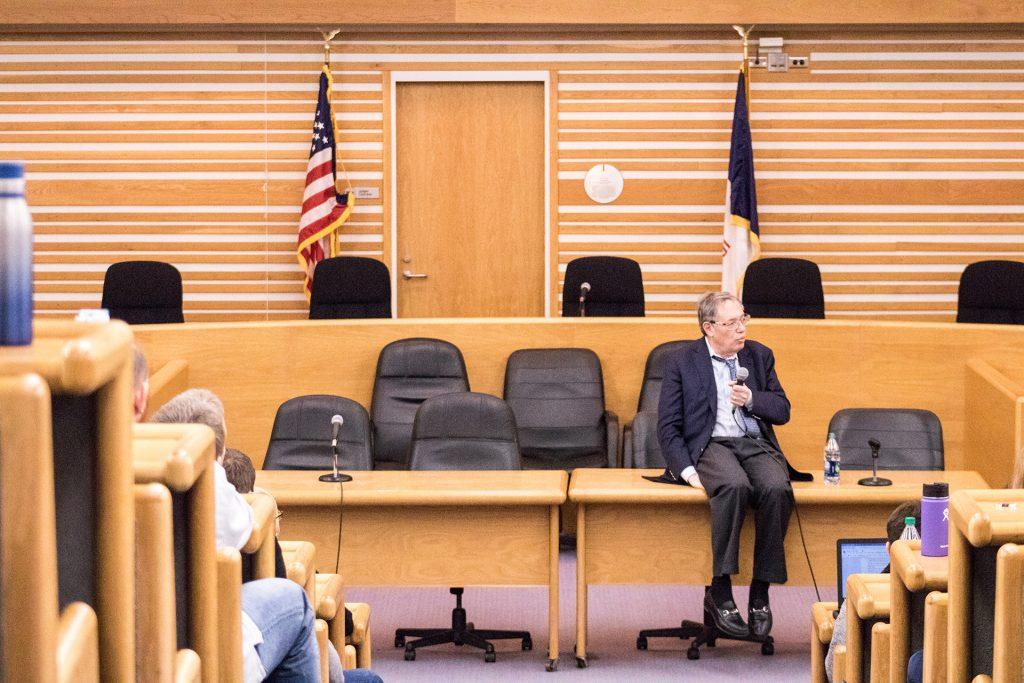Deterrents against homicide and remedies for public safety were some of the issues discussed by New York University law Professor Richard Epstein during a Thursday afternoon lecture at the Boyd Law Building.
The lecture was organized by the University of Iowa chapter of the Federalist Society.
Epstein talked about a variety of topics relating to gun regulation and general security. One of his specific talking points was how the wording of the Second Amendment (“A well-regulated militia, being necessary for the security of a free state, the right of the people to keep and bear arms, shall not be infringed”) affects people’s interpretation of it.
Afterwards, he took questions from the audience.
“I thought [the lecture] was great. I know he’s a really celebrated thinker … I thought he gave a really fair and interesting talk,” Brian Talcott, a second year UI law student, said.
RELATED: In the gun control debate what’s the priority? Safety or freedom?
Epstein said a principle of regulation is that people adapt to their situations, meaning that a restriction on firearms would only lead to an increase in the number of homicides by knives, vehicles, or even mail bombs. He argued that anybody with the desire to kill would still do so with or without gun sanctions, because they don’t have the moral standards that non-homicidal people do.
He noted that the number of people who commit suicide after attempting or committing homicide, such as recent San Bruno shooter Nasim Aghdam, is high, and thus the death penalty is no deterrent against murder for people who want to die.
“I think, given the high rate of suicide, it’s extremely difficult [to deter homicides]. The death penalty is extremely difficult to impose, and it takes 20 or 30 years to do it,” Epstein said. “If somebody knows they’re going to live for 20 years and have a 50 percent chance of getting off, the death penalty is not going to be a penalty for them. I think the better strategy is higher rates of apprehension and quicker convictions, even with shorter terms.”
He said many offenders, including Aghdam and Parkland gunman Nikolas Cruz, were turned in to the police for evaluation of their threat to public safety but were released.
RELATED: UI law professors tackle free speech issues during public panel
After a maiming or assault, he said, the victim can be compensated, but such reparations aren’t possible for murder victims, leading their families to, at times, sue people they wrongly believe are at fault for their loved ones’ deaths.
Epstein gave the example of companies that provide firearms that are used to save peoples’ lives during attempted rapes or robberies and compared them to pharmaceutical companies that make drugs used to prevent life-threatening illnesses.
The companies would be unable to make firearms and medicine that save people if their funds are reallocated to victims’ families whose deaths they never intended.
He gave the example of a driver’s license being a way to weed out inexperienced or potentially dangerous drivers, much in the same way that gun ownership is often licensed to experienced and safety-oriented individuals. People who want to do harm, no matter how thorough a system is, will still find ways to access both vehicles and guns, he said.
“[Epstein is] a very modern scholar … if you go look at his bibliography on the NYU website, his list of publications goes for more than 70 pages,” said Robert Miller, a UI law professor and the faculty moderator for the Federalist Society. “He’s one of the most cited law professors in the world. [Epstein] is a mainstay of the Federalist Society, so he’s in very high demand.”



